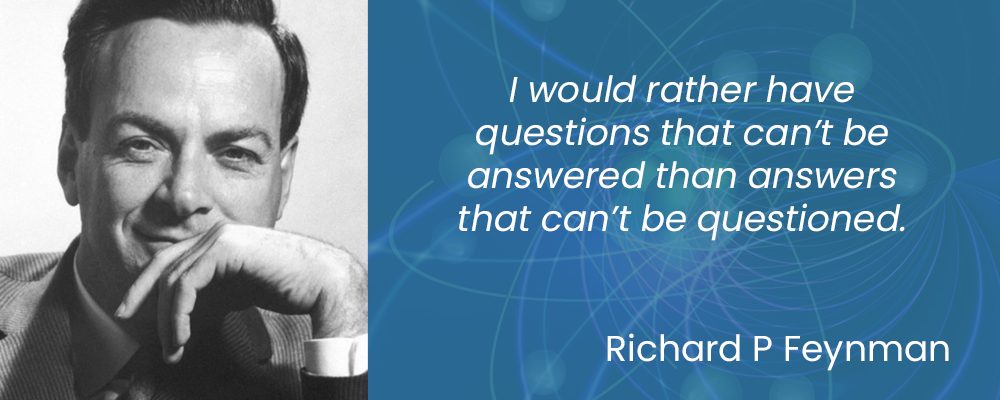Top 10 interview questions for physicists
Author: IntaPeople | Date published: 30/07/20


Assessing candidates and facilitating a conversation is an important skill, especially in industries with skill shortages where selling the role is vitally important. We asked our clients what interview questions they ask when hiring physicists and compiled the best ones to help you create a positive interview experience.
It’s well documented that there’s a shortage of STEM candidates, consequently job interviews have become more of a conversation rather than interrogation, where employers are having to sell their company and role, as well as checking the applicant is a suitable match.
We have seen countless examples of the problems companies face when trying to recruit high-level physicists, including new starters not working out and companies losing out on the best candidates to competitors, this all stems from the relative success or failure of the job interview.
We asked several of our clients which interview questions they ask when hiring physicists to not only calculate suitability, but to pique the candidate’s interest and impulse towards their company. If you are struggling to hire the right talent or you’ve made poor hiring choices in the past you may want to ask some or all of these when you conduct your next physicist interview. (These questions aren’t necessarily to be asked in this order)
1. What interests you about this industry?
It seems like a simple and generic question, but your interest should lie in how they answer. If, for example, you work in a niche sector, is it a sector the candidate has been trying to join for a long time? How much do they know about it? How passionately do they talk about it? How they respond will give you a better understanding of the candidate’s motivations and how much research they have done beforehand.
 2. What are your long-term career goals?
2. What are your long-term career goals?
As there’s a severe shortage of physicists in the UK, it’s important you show a genuine interest in their career goals. Not only does this leave a good impression on the candidate, it also gives you an indication on how to get the best out of this candidate, keep them engaged and motivated.
3. How do you think your Professor/Manager would describe you?
This is a clever twist on the classic “what are your strengths?” question. It’s an obvious self-assessment which will tell you where they’ll fit in the team and if they’re right for this vacancy (which we’ll get on to later). From my experience asking similar questions, physicists are likely to mention weaknesses here as they are naturally analytical.
This question can also give you a peak behind the curtain as some interviewees will discuss technical traits exclusively and others will discuss personal/character traits too, which potentially gives you an insight into the candidate’s relationship with their superior.
4. How do you determine or evaluate success?
This is an interesting one and not something the interviewee may have actively thought about before, but it can create an insightful discussion. Without delving too deep into psychology, a good tip is to reveal how you, the interviewer, determine or evaluate success. This is especially handy if the candidate is struggling to answer. By revealing something personal about yourself, the candidate is more likely to answer honestly.
The purpose of asking this question is to discover their ambitions and how they operate. Some might determine success as hitting their yearly targets or gaining promotion, others will determine success on a more day-to-day/task-by-task basis. Depending on their seniority, candidates may even discuss company/team goals. You may also want to use this information to praise your new employee when they achieve what they regard as a success. If something is important to your employee, recognise it.
5. What interests you about our company?
How much research has the interviewee done beforehand? How enthusiastically are they talking about your technology/projects? What does a poor answer here tell you about the candidate; that they lack interest or are poorly prepared?
Added note, this may tell you that your website needs updating!
6. What would you like to achieve at this company?
Are you getting a similar answer here as in question 2? None of these questions are intended to be cunning or sly but it’s something worth paying attention to. You may also want to take in to account whether this candidate can achieve such things at your company. Would you potentially be expecting more? Do your ambitions align?
Is the candidate focused on gaining leadership responsibilities? Is this something you are going to be able to offer? After a year’s time this could be offered somewhere else if it isn’t offered at your company and you could end up losing a key employee.
 7. What is the most difficult part of being a physicist/your current job?
7. What is the most difficult part of being a physicist/your current job?
When reviewing their answer, you’ll need to consider if this is something they will be doing at your company. If not, champagne and bubbles. If so, is this an area you can help them develop? Why do they find it so difficult?
When asking candidates this, we’ve received answers that we perhaps didn’t expect or wasn’t listed as a responsibility on their CV. What if the candidate hates public speaking or presenting and doesn’t wish to do this? This may not be listed on your job description but it’s something you’d expect from your physicist. Is this someone you’ll be sending to key customers/ clients to represent your company? It’s worth noting.
8. How is your background relevant to us?
As alluded to in question 3, can this candidate do the job? However, this is where many interviewers miss out on an opportunity. If this candidate fulfils the requirements of a high percentage of the job description…. what else can they do? They may not be right for this vacancy, but is there another position in another department they might be more suited to? Is there a role arising in a month’s time that they’ll be perfect for?
Although the above is true for many, physicists usually have a wide array of skills that could be valuable across many areas of your company (especially in start-ups or smaller companies). Physicists are likely to have skills in data science, data analysis, programming, presenting, bid writing, report writing, and some may even have interests in machine learning, computer vision, patent portfolio management, accounting, software engineering and the list goes on!
9. Why do you want to transition from academia to industry?
This may not be applicable for most interview with physicists, but many graduates or academic researchers can face difficulties transitioning from academia to industry, having sometimes spent many years at University, it can certainly be a culture shock.
Bachelor’s degree graduates: In education, the lesson comes first, and the test comes second. Outside of education, the test comes first, and the lesson comes second. It’s worth discussing the differences they will face. At times they may be expected to work autonomously, show initiative etc.
PhD graduates or higher: This transition is slightly different as a PhD student would be expected to work autonomously. It’s worth asking about what they particularly enjoy about academia and what they don’t. For example, PhD students tend to enjoy the autonomy and the flexibility in their working hours that they have during their studies. Is this something they’d lose if they were to join your company? This is an excellent opportunity to sell your company benefits.
 10. Logic question/Technical question
10. Logic question/Technical question
This again is purely for suitability purposes. You may want to ask one or a series of specific technical questions that are relevant to your technology.
The logic question is to discover HOW they reach an answer or a solution to a problem. For example; A person is in a rowing boat floating on a lake, in the boat they have a brick. They throw the brick over the side of the boat so as it lands in the water. The brick sinks quickly. As a result of this, does the water level in the lake go up or down?
May seem cliché, but the aim is to discover how this candidate thinks, can they apply their knowledge to a problem.
With questions like these you can really get to know more about the candidate, finding out what motivates them and understand their goals. These questions all facilitate a conversation rather than an interrogation, they allow for follow up questions and best of all they make the candidate feel valued before they even get the job. If your interviewees feel you care about their goals and are willing to help achieve them, they will be pleased to accept an offer from your company.
Alternatively, if you just quiz them solely on their technical capability and don’t discuss broader topics you are opening yourself up to the key problems mentioned; making bad hires or losing talent to competitors.
If you’re struggling to attract or retain physicists or STEM talent get in touch. As a specialist recruitment team, we have the expertise to help you achieve your hiring goals.
